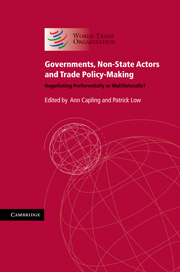Book contents
- Frontmatter
- Contents
- List of figures and tables
- List of contributors
- Acknowledgements
- Disclaimer
- Introduction
- 1 The domestic politics of trade policy-making: state and non-state actor interactions and forum choice
- 2 Chile
- 3 Colombia
- 4 Mexico
- 5 Indonesia
- 6 Thailand
- 7 Jordan
- 8 Kenya
- 9 South Africa
- 10 The influence of international non-state actors in multilateral and preferential trade agreements: a question of forum shopping?
- 11 Main findings and conclusions
- Index
- References
1 - The domestic politics of trade policy-making: state and non-state actor interactions and forum choice
Published online by Cambridge University Press: 05 July 2014
- Frontmatter
- Contents
- List of figures and tables
- List of contributors
- Acknowledgements
- Disclaimer
- Introduction
- 1 The domestic politics of trade policy-making: state and non-state actor interactions and forum choice
- 2 Chile
- 3 Colombia
- 4 Mexico
- 5 Indonesia
- 6 Thailand
- 7 Jordan
- 8 Kenya
- 9 South Africa
- 10 The influence of international non-state actors in multilateral and preferential trade agreements: a question of forum shopping?
- 11 Main findings and conclusions
- Index
- References
Summary
This chapter outlines the conceptual framework and surveys the existing literature underpinning the case studies that follow. This survey is as important for some of the gaps it reveals as it is as a stock-taking of previous conceptual and empirical work. The first section explores the literature on the evolution of trade policy-making in domestic settings and, in particular, the imperatives that are driving trade ministries to engage much more closely with non-state actors (NSAs) in the formulation of trade policy. Most of this research has focused on government-initiated consultation exercises and it has been largely descriptive rather than analytical. Nonetheless, these studies have yielded some preliminary findings that are relevant to this project, and these are briefly discussed. Section 2 outlines the major theories of trade policy-making more generally, with a view to shedding light on the competing explanations of preference formation and how governmental and NSA preferences are translated into policy choices. While each group of theories offers illuminating insights, we suggest that none alone can adequately explain the complexity of trade policy-making in the real world, and we argue for a synthetic approach that is attuned to the role of interests, ideas and institutions in understanding the policy process. The third section discusses the issue of forum choice. Compared with the growing literature seeking to explain why governments might prefer regional to multilateral approaches to trade cooperation, there is very little analysis of NSA preferences in relation to forum choice, let alone any research that seeks to investigate this through the prism of government–NSA interactions. This section lays out some of the issues that may influence forum choice among decision-makers, but has little to say as to whether these same factors will influence NSA attitudes to forum selection. That, indeed, is one of the key questions to be addressed in this project.
- Type
- Chapter
- Information
- Governments, Non-State Actors and Trade Policy-MakingNegotiating Preferentially or Multilaterally?, pp. 4 - 28Publisher: Cambridge University PressPrint publication year: 2010
References
- 4
- Cited by



